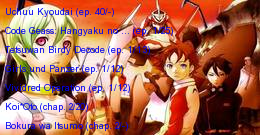Damn, that was a fantastic, riveting episode, as it was suffused with a plethora of significant developments that partially illuminated the complexities surrounding the darkly mysterious nature of the world. Despite expository dialogue permeating the episode, the excellent pacing never faltered, which is a testament to how brilliantly the writing and direction complement the fluidity of the story.
This episode revealed an extensive amount of insight into the blood-stained evolution of their world, most notably through the weaving of the historical preludes that have opened each episode into a layered, interconnected tapestry. The manner in which Boy A's actions were illustrated evoked a highly unsettling atmosphere, since we're provided momentary glimpses of the carnage borne from his harrowing brutality, as nineteen were raped and seventeen were murdered. Essentially, these actions propelled the societal descent into chaos and an eventual decay. It was rather interesting, though not entirely unexpected, to notice how astonished they were upon learning that humans are actually capable of murder. One of the most intriguing scenes was when the suppressed memory of Saki severely desiring to kill the old Priest was unveiled, in which she had temporarily suffered through the "death feedback".
The most compelling moment, I feel, involved the minoshiro bursting into flames, consequently illuminating the image of a woman holding a baby. Given the visually momentous nature of the framing within that scene, it could potentially foreshadow an adult Saki holding her child. Another interesting shot was Saki's anguished expression that accompanied the seemingly painful moment in which her Cantus was pierced by the monk, thus creating a distinct parallel to the moment the same occurred in the first episode. The minoshiro also revealed that Fiends suffer from "Fox in the Henhouse" syndrome, while Karma Demons suffer from Hashimoto Appelbaum syndrome. Once again, the terminology remains somewhat indistinct, yet there's a certain level of understanding toward what these allude to. However, it remains unclear whether these afflictions reside in any of the main characters, though it seems quite possible, given the ominous declaration at the end of episode two, which might infer that Maria could very well be a Fiend or Karma Demon herself.
I especially liked the moment when, as they're unraveling the morbid history of their world, Saki's eyes close immediately following an image of a murderer's eyes opening, effectively depicting the contrasting sensibilities between one that relishes his awakened savagery and one that is repulsed by it. I loved the illusory touch of distorting the minoshiro's voice as, while discovering the truth surrounding the plethora of disturbingly cruel Emperors, Saki becomes increasingly unwilling to listen, tormented by this unforeseen depravity. My favorite sequence though, by far, was when the monk slaughtered the group of evolved, hostile queerats, which was particularly beautiful due to their hidden form revealing itself as something that appeared to be a human crying out, which potentially implies that the queerats are descended from those who previously existed as part of the hunter tribes. This could also intimate that the Elders are somehow using suggestive telepathy to conceal their true manifestations.
Their moments of reluctant curiosity were illuminated very effectively, such as their pained trepidation at what might await upon wholly discovering which segment of civilization their ancestors came from. As such, the identity of their ancestors was divulged as the scientists, which, at first, they were relieved to hear, but were then mortified once more as the dark truth that surrounded their actions was revealed, effectively indicating that human nature inevitably predetermines an animalistic proclivity. Following the fall of the various empires, the scientists sought to deconstruct and control humanity's psychic abilities.
It was quite interesting to learn that the scientists temporarily examined the bonobos as a means to induce a peaceful, compliant nature among the humans. Through this, they began using sex to allay the threat of violence being awoken, which, I can only assume, will likely play a considerable part as the story progresses. Despite this, whatever sex they'll eventually engage in seems likely to be wholly devoid of emotion, used solely as a means to an end. Following their failure to produce flawless results, the scientists conjured the idea to restrain violence by altering their genetic makeup, filtering in a "death feedback", a form of manipulation that prevents murder among those who possess Cantus by inducing partial organ failure. All of this tightly structured control eventually led to the "removal" of children who were potentially dangerous, which becomes even more unsettling, since it's known that humans are entirely incapable of killing other humans.
The character development was quite significant as well, since the events of this episode essentially signified an irrevocable loss of innocence. The future for them is rather unknown in regards to the psychological effects and implications from their newly acquired knowledge, but it's possible that some could construct a facade of relatively deadened emotions. Saki is a terrific character, due to her wonderfully complex characterization. There's a subtle dichotomy between her innocent exterior and the restricted emotions of a seemingly violent persuasion that lie dormant within, particularly displayed in several instances throughout the episode, such as the suppressed memory of her having desired to kill the aged priest. Saki also displays a heightened level of acute perception, as she's the only one who realizes Rijin as the true enemy.
The production values remain remarkably impressive. The direction, in particular, is excellent, especially in the nuanced framing of certain shots, which was especially noticeable in one of the final scenes, as the clouded apparition briefly, but strikingly appears in the midst of the dust that surrounds the queerats' dying bodies. The music was consistently superb throughout, thankfully lacking the jarring quality that was present in the past episode or so. I especially loved the suitably beautiful, amazingly atmospheric musical selection that accompanied the scene in which Rijin kills the queerats. The sound mix was really good as well; the complete isolation of Saki's voice as she tentatively asks, "what did he do", was exceptionally well done. The animation is able to brilliantly capture their specific emotions through detailed facial expressions and an impressive use of quick edits. This allows for a necessarily convincing portrayal of their emotional fragility. Above all, the writing is, up to this point, extremely strong. The manner in which the story has been carefully, meticulously told is extremely refreshing.
All in all, From the New Worlds continues to excel with it's thoroughly interesting narrative, writing, and direction. What's most intriguing is the vague, unpredictable nature surrounding which path the story will take from here. I'm very excited for the next episode, and, judging by the preview, I'm looking forward to seeing how exactly they'll manage to survive without the ability to wield their temporarily sealed Cantus, and I'm assuming they'll be stranded in the forest for quite some time. |










